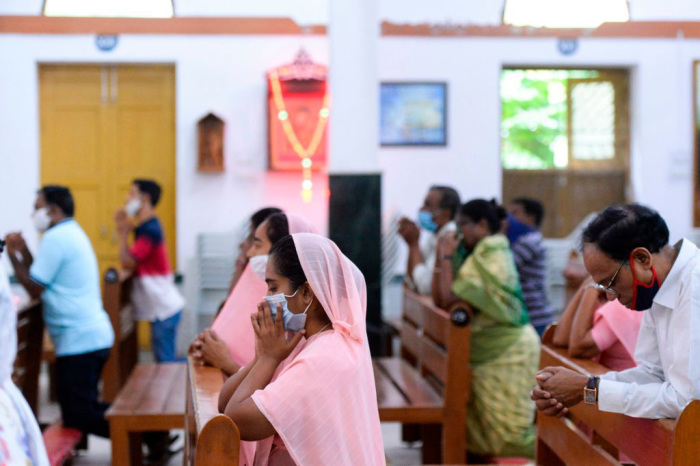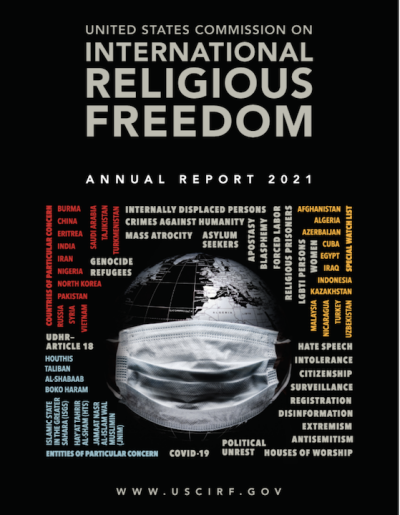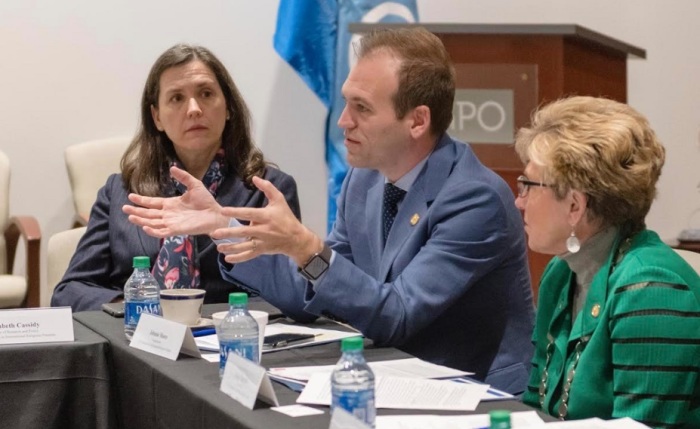COVID-19 restrictions 'harmed' religious minorities, violated freedom to practice faith: USCIRF report

The U.S. Commission on International Religious Freedom warned Wednesday that some countries have used COVID-19 restrictions to discriminate against religious minorities or blame them for the spread of the virus.
USCIRF, a bipartisan commission tasked with informing Congress and the federal government about global religious freedom concerns, released its 2021 annual report detailing the international religious freedom conditions in a year plagued by a pandemic.
The cover of this year’s report, which details where religious freedom is “improving or in peril,” features a globe shrouded in a face mask, showing the worldwide implications the pandemic had.

USCIRF Chair Gayle Manchin said at a press conference that though public health measures in most countries to slow the spread of COVID-19 complied with international human rights standards, some countries used these measures to discriminate against religious minorities.
“Unfortunately, it had a negative impact in many ways …,” she said. “What we found to be unacceptable were where minorities were targeted in much stricter fashion, and their activities were restricted much more harshly than other religions across the country, and that’s where the problem arose.”
“Also, there were countries that literally blamed the COVID-19 virus on a particular religion, [claiming] that they were responsible for the spread of that virus across their country,” she continued.
Some countries used the pandemic as an “excuse” to “punish and penalize” minority religious groups.
“While many of these restrictions were justifiable under public health exceptions defined in international law, some restrictions harmed religious minorities or otherwise violated freedom of religion or belief,” the report reads.
Where certain religions were targeted or blamed for causing the spread of the virus, there was a greater risk of being arrested and placed in prison or “deplorable conditions.”
“As the restrictions are lifted, we will be watching very closely to make sure that those restrictions are being lifted fairly across the country to all religions,” Manchin said.
One example is Malaysia, where “non-Muslim houses of worship, including Hindu temples and Christian churches, were not prioritized for reopening and faced different reopening times than mosques.” Additionally, the country banned refugees and migrants from entering mosques.
In Turkey, an individual attempted to “set fire” to an Armenian church for “bringing the coronavirus.”
USCIRF noted that in Pakistan and Saudi Arabia, “government authorities indicated Shi’a religious communities were responsible for the spread of coronavirus and subjected some neighborhoods and localities to stricter lockdown measures.”
In Pakistan, Sunni extremist groups blamed Shi’a Muslims for bringing coronavirus to Pakistan, calling it the “Shi’a virus.” According to the report, these extremists were “egged on by government and media claims that the virus came from pilgrims returning from Iran.”
USCIRF also reported that Muslims in India and Cambodia faced increased stigmatization “because some of the earliest patients to test positive for COVID-19 in those countries came from these communities.” In India, “Muslims were accused of spreading COVID-19, leading to a reported increase in attacks on members of the community.”
“In Sri Lanka, authorities insisted on the cremation of those who died from COVID-19, including Muslims for whom the practice is religiously prohibited,” the report notes. “However, the World Health Organization cites a lack of evidence that cremation of COVID-19 victims is necessary for public health reasons. USCIRF expressed concern about this requirement, and welcomed its lifting in early 2021.”
The commission reported that “the pandemic also fostered a wave of misinformation targeting religious minorities.”
The annual report assesses the religious liberty standards in 26 countries to provide policy recommendations to the U.S. government.
USCIRF recommended that the U.S. State Department recognize over half of the countries analyzed as countries of particular concern. The CPC designation is for the “worst of the worst” countries whose governments “engage in or tolerate systematic, ongoing, and egregious violations of religious freedom.” The designation carries with it the possibility of sanctions.
USCIRF named 14 countries to be designated CPCs. These include 10 countries already recognized by the State Department as CPCs: Burma, China, Eritrea, Iran, Nigeria, North Korea, Pakistan, Saudi Arabia, Tajikistan and Turkmenistan.
The remaining four of the commission’s CPC list include India, Russia, Syria and Vietnam, which are designated as CPCs by the U.S. State Department.
The Indian government and its allies have reportedly pressured USCIRF to reverse its recommendation to label India as a CPC.
The commission also noted how China continues to be an egregious violator of human rights, specifically toward Christians and Uyghur Muslims.
Tony Perkins, USCIRF vice chair and president of the conservative Christian organization Family Research Council, said China was one of the most “troubling developments” in this year’s report.
China is engaged in mass internment of Uyghur Muslims in the Xinjiang Province, which was declared a genocide and crime against humanity by the U.S. government under the Trump administration in January.
The U.S. was the first country to adopt such terms to describe the CCP’s human rights abuses against Uyghur Muslims.

USCIRF Commissioner Johnnie Moore noted that the USCIRF first highlighted Uyghur persecution in its first report 25 years ago. But he said the world largely ignored the situation. Over two decades later, the plight of Uyghur Muslims in China has only exacerbated.
“This is not the time to give the Chinese Communist Party one inch. …,” Moore, an evangelical author and public relations executive, said. “This issue is an issue that sits alone in its severity and its impact, and we speak with one concerted voice on it.”
North Korea, another CPC, is an oppressive abuser of human rights and forbids all competing ideologies outside of the deification of its leaders, USCIRF Commissioner Frederick Davie shared.
North Korea treats religion as “an existential threat,” considering religious believers as “hostile enemies of the state,” resulting in intense persecution, Davie added.
Nigeria, a CPC, is plagued with Islamic extremist violence in the northeast, communal violence in the Middle Belt and mass kidnappings. James Carr, a USCIRF commissioner, called Nigeria Africa’s "diamond in the rough."
“Nigeria is a country of 200 million-plus citizens, a standing military of 300,000, and reserves of 100,000, and they tell us they can’t stop the kidnappings, the rapes, the murders of schoolchildren as well as adults? Let me quote President Biden, ‘Give me a break, man,’” Carr said.
Another development in this year’s report the committee raised is the rise of anti-Semitism globally.
USCIRF released a report earlier this month on the rise of anti-Semitism in Europe, which focused on findings in 11 European countries.
“We saw, all over the world, the Jewish community, in particular, targeted every way you can imagine as the virus spread, including the appropriation of some of the most obvious, egregious, unconscionable anti-Semitic tropes that should be relegated to the ash heap of history, yet they were almost ever-present in parts of Europe and in other places around the world as COVID-19 spread,” Moore explained.
Despite the pandemic and the overall worsening of religious freedom worldwide, the commission noted improvement of religious freedom conditions in some countries over the past year, which led to the removal of three countries from the USCIRF Special Watch List.
Bahrain, Central African Republic and Sudan are no longer recommended for the SWL designation since their conditions had improved and no longer met the requirements for that second-tier State Department classification.
Religious liberty in Sudan began improving after its dictator was ousted in 2019, a new constitutional declaration was issued and the transitional government took steps to improve freedom and human rights.
Bahrain, a small Muslim-majority country, has improved by becoming increasingly tolerant of minority religions in recent years.
Perkins said another positive that came from the past year was religious liberty prioritization in U.S. foreign policy.
In June 2020, the Trump administration administered an executive order on advancing international religious freedom, which established religious freedom worldwide as a “political priority of the United States."
The USCIRF report includes recommendations for how the U.S. government should respond to religious freedom grievances for each country included in the report.
The report also included a new section detailing how USCIRF recommendations were implemented in 2020 and early 2021, following the release of last year's report.




























